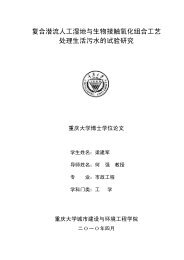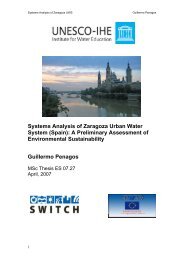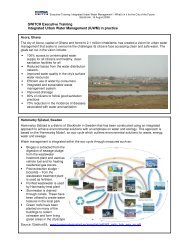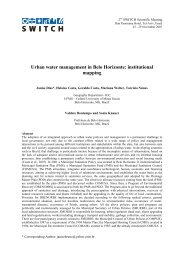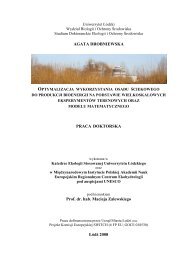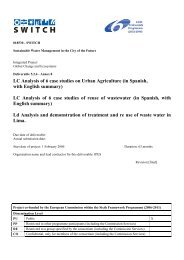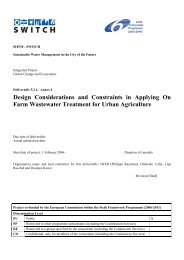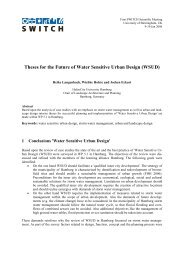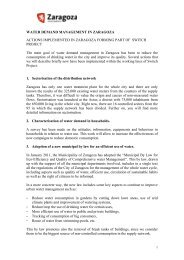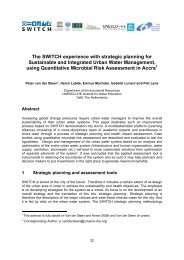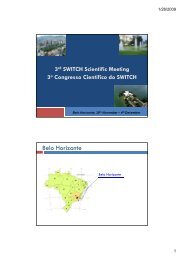Good practices for Social inclusion - Case studies and summary
Good practices for Social inclusion - Case studies and summary
Good practices for Social inclusion - Case studies and summary
You also want an ePaper? Increase the reach of your titles
YUMPU automatically turns print PDFs into web optimized ePapers that Google loves.
Composting or vermi-composting is done by community women, in small groups or<br />
in the community. The RT (neighbourhood association) employs a male or female<br />
in<strong>for</strong>mal private collector or collectors to collect, sort the wastes in a local site <strong>and</strong><br />
sell recyclables to the secondary in<strong>for</strong>mal private sector to combine service with<br />
poverty alleviation. Alternatives: Families segregate bio-degradable <strong>and</strong> other<br />
recyclable wastes at source <strong>and</strong> in<strong>for</strong>mal private collectors (men <strong>and</strong> women) or the<br />
local youth groups collects <strong>and</strong> sells the different wastes to the secondary in<strong>for</strong>mal<br />
sector <strong>for</strong> income generation.<br />
Civic-Public-Private Partnership<br />
RTs (neighbourhood associations) employ (or households directly pay) poor female<br />
<strong>and</strong>/or male solid waste collectors from the in<strong>for</strong>mal private sector <strong>for</strong> door-to-door<br />
collection. The collectors bring the waste to city-established decentralised SWM<br />
stations where they segregate the wastes <strong>and</strong> sell it on to the secondary private sector.<br />
The remainder is brought to the city dump <strong>for</strong> safe end disposal. Alternatively,<br />
households already segregate the wastes at home, in<strong>for</strong>mal private collectors collect<br />
them at the homes <strong>for</strong> processing/selling <strong>and</strong> different family members bring the<br />
remaining waste to the TPS, where the city collects it <strong>for</strong> final disposal.<br />
Cadres from the city health services <strong>and</strong> national women‘s programme <strong>and</strong> elected<br />
leaders of the RTs, RWs <strong>and</strong> Kelurahans (lowest levels of local government) will<br />
in<strong>for</strong>m meetings of male <strong>and</strong> female heads of households in the neighbourhoods about<br />
the options <strong>and</strong> help them make in<strong>for</strong>med choices <strong>and</strong> plan, organise <strong>and</strong> test services.<br />
Where <strong>for</strong>ms of neighbourhood-based SWM are already practised, horizontal learning<br />
will be encouraged. Under this strategy, the cities assist leading women <strong>and</strong> men from<br />
the concerned neighbourhoods or groups to visit women groups <strong>and</strong> community<br />
meetings in other communities to in<strong>for</strong>m them, explain <strong>and</strong> demonstrate the processes<br />
<strong>and</strong> product, invite participants to visit their communities <strong>for</strong> observations <strong>and</strong><br />
interviews <strong>and</strong> give h<strong>and</strong>s-on training with an agreed compensation.<br />
The city strategies will include special attention <strong>and</strong> measures to ensure that poor<br />
women <strong>and</strong> men participate in learning <strong>and</strong> decision-making on partnerships in SWM:<br />
- Extending in<strong>for</strong>mation about <strong>and</strong> invitations to meetings;<br />
- Using extension methods suitable <strong>for</strong> non-literate participants;<br />
- Accounting <strong>for</strong> participation of poor women <strong>and</strong> men in trainings;<br />
- Ensuring poor women‘s <strong>and</strong> men‘s shares in decision-making bodies <strong>and</strong><br />
sessions;<br />
- Ensuring that procedures <strong>and</strong> documentation are gender <strong>and</strong> poverty<br />
specific.<br />
An important part of the SWM city strategies is the protection against environmental<br />
<strong>and</strong> health risks of segregation, collection <strong>and</strong> recycling at home, by the employees of<br />
the city service <strong>and</strong> by the men, women <strong>and</strong> children in the in<strong>for</strong>mal sector as<br />
analysed by Cointreau <strong>and</strong> Hunt 37 . Better education <strong>and</strong> training, improved working<br />
37 Cointreau, S<strong>and</strong>ra (2006). Occupational <strong>and</strong> Environmental Health Issues of Solid Waste<br />
Management<br />
56



